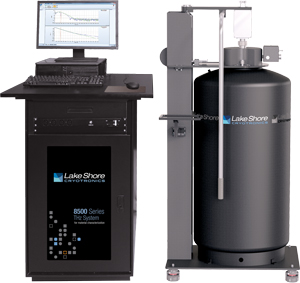 Lake Shore Cryotronics is now offering a fully configured probe station for scientists in need of a basic cryogenic probe station at an affordable price.
Lake Shore Cryotronics is now offering a fully configured probe station for scientists in need of a basic cryogenic probe station at an affordable price.
A fully specified, prepackaged platform that uses components from Lake Shore’s existing TTPX probe station line, the Model PS-100 tabletop cryogenic probe station features four-point triaxial probing for applications requiring sensitive, high-impedance DC measurements.
“With the PS-100, we’re offering a straightforward cryogenic probing solution without the complexity of choosing from multiple configuration options,” said Scott Yano, VP of Product Development at Lake Shore. “We have chosen the four-arm triaxial configuration because it is the most commonly requested configuration and serves many different applications.”
Offering versatile cryogenic testing, the PS-100 is well suited for labs with limited funding or who are just starting out with materials testing. “It’s also the choice for researchers who need a solution quickly. Typically, it can be in your lab worldwide in less than a month from the time it’s ordered,” Yano explained. “Setup is easy, too. Just add cryogen and a vacuum pump.”
The PS-100 features the same performance specifications as Lake Shore’s existing TTPX probe station with high-stability operation over the full TTPX temperature range. The probe station offers:
- High-precision, micro-manipulated stages for accurate probe tip placement.
- Precise temperature control with the included Lake Shore Model 336 controller.
- Complete thermal anchoring and radiation shielding to keep heat from reaching the sample and adversely affecting sample temperature accuracy.
- Cryogenic operation with either liquid nitrogen or liquid helium.
- A probe starter kit that has six probes, including two of Lake Shore’s patented continuously variable temperature (CVT) probes.
The PS-100 also can be upgraded with standard TTPX options in the field, including low- or high-temperature options, support for larger sample sizes, vibration isolation and backside optical access. “As your research needs change, so can your probe station, which makes it a good choice for users who would like longer term flexibility,” Yano said.
Lake Shore probe stations support a number of research applications for non-destructive testing of devices on full and partial wafers at varying temperatures, whether for measuring magneto-transport, electrical, electro-optical, parametric, high Z, DC, RF, or microwave properties. Many researchers use the probing technology for electrical characterization of microelectronic devices and studying semiconductor characterization and transport, as well as for MEMS, spintronics, and nanoparticle R&D. Plus, a number of chemistry-based researchers are using probe stations for the study of organic electronics and the structural control of graphene.
For more information about the Model PS-100 tabletop cryogenic probe station, click here.



